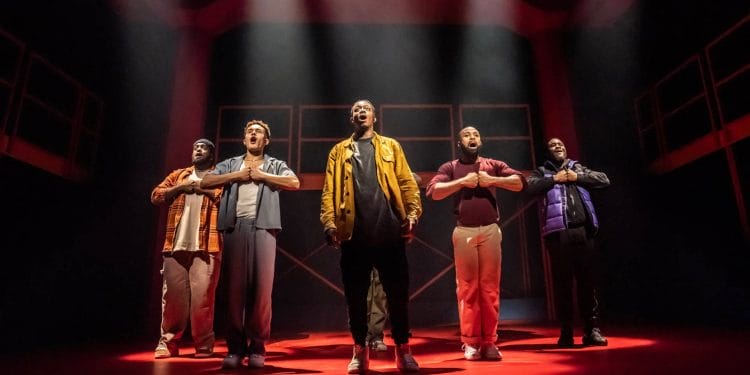 For Black Boys Who Have Considered Suicide When the Hue Gets Too Heavy, is a sleeper hit that started out on the fringe at the New Diorama theatre. Following sell-out performances and boosted by a loyal fan-base, this high-octane production transferred to the Royal Court before arriving in the West End and triumphantly receiving two Olivier nominations.
For Black Boys Who Have Considered Suicide When the Hue Gets Too Heavy, is a sleeper hit that started out on the fringe at the New Diorama theatre. Following sell-out performances and boosted by a loyal fan-base, this high-octane production transferred to the Royal Court before arriving in the West End and triumphantly receiving two Olivier nominations.
Dealing with complex subjects like mental health, domestic violence and sexuality, it’s creator Ryan Calais Cameron researched the play by running therapy-style sessions for young Black men. Indeed the piece is set as an open-ended talking therapies session where the participants “let their hearts – and imaginations – run wild.”
Inspired by Ntozake Shange’s groundbreaking work For Colored Girls Who Have Considered Suicide / When The Rainbow Is Enuf, Cameron’s For Black Boys, is structured around non-linear dialogues between six young British Black men sharing soul-baring, life experiences that they feel have shaped them into the people they are now.
With the backdrop of suicide running throughout their stories, amongst the many topics, the men talk of toxic masculinity adversely affecting black men’s health, racism, gang culture, police harassment and romance.
There is no single storyline that tethers their diverse experiences together, and Cameron uses a mixture of pulsing poetry, hip-hop, R&B music and physical theatre, to explore what it means to be a Black man in 21st-century Britain.
Under Theophilus O. Bailey’s fluid choreography the actors frequently dance and move around, each seamlessly in unison as if they are one huge constantly morphing organic cell.
What makes the production succeed is the commitment of the company to galvanise itself into a highly potent ensemble.
Each cast member (Tobi King Bakare, Shakeel Haakim, Fela Lufadeju, Albert Magashi, Mohammed Mansaray, Posi Morakinyo), equally bestows their own unique skills to make the fragmented piece become one whole.
Anna Reid’s stark pink, blue, and green colour set adds a slightly hallucinogenic feel to the brutal psychological landscape the men are exploring together.
When the piece seems to be getting too dark, comedy is cleverly juxtaposed to blend in light and shade.
Despite its sombre title, in many ways, For Black men is ultimately also a joyful celebration of empowerment and healing: “I found a king in me and now I love you. I found a king in you and now I love me”

















